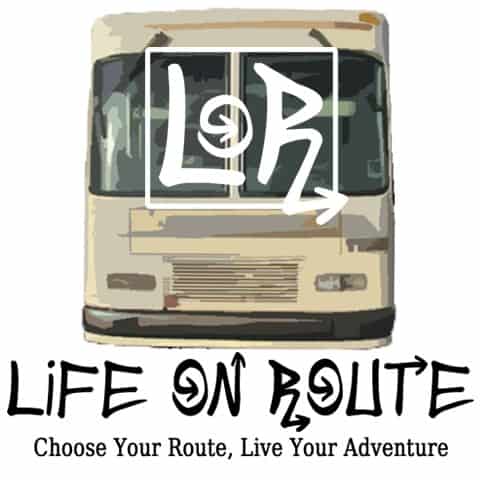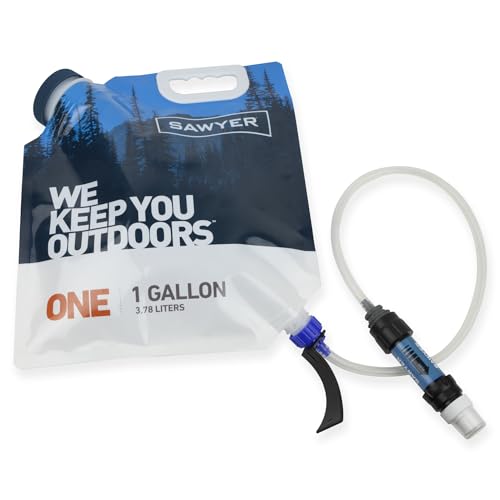This post contains affiliate links.
Washing your backpacking dishes and cookware on the trail takes more than a few licks and a quick wipe. It takes soap, water and a strategy. Whether you’re trail hiking or just bushwacking, getting sick is never good, and stomach bugs will ruin a trip fast.
Cleaning your dishes properly reduces bugs and pests around camp and prevents animals from visiting. As with all activities in the wilderness, we want to “leave no trace” of soap, detergents, or food scraps behind.
How do you wash dishes while backpacking? The three main methods of dishwashing are:
- Bringing a collapsible bucket for a kitchen sink
- Using your camp pot or bowl to hold soapy water.
- Cascading soapy water from one dish to another while scrubbing them.
All 3 of these methods work well, and best in warm water. Below we’ll tackle all the topics you need to know to make dish washing easier while backpacking.
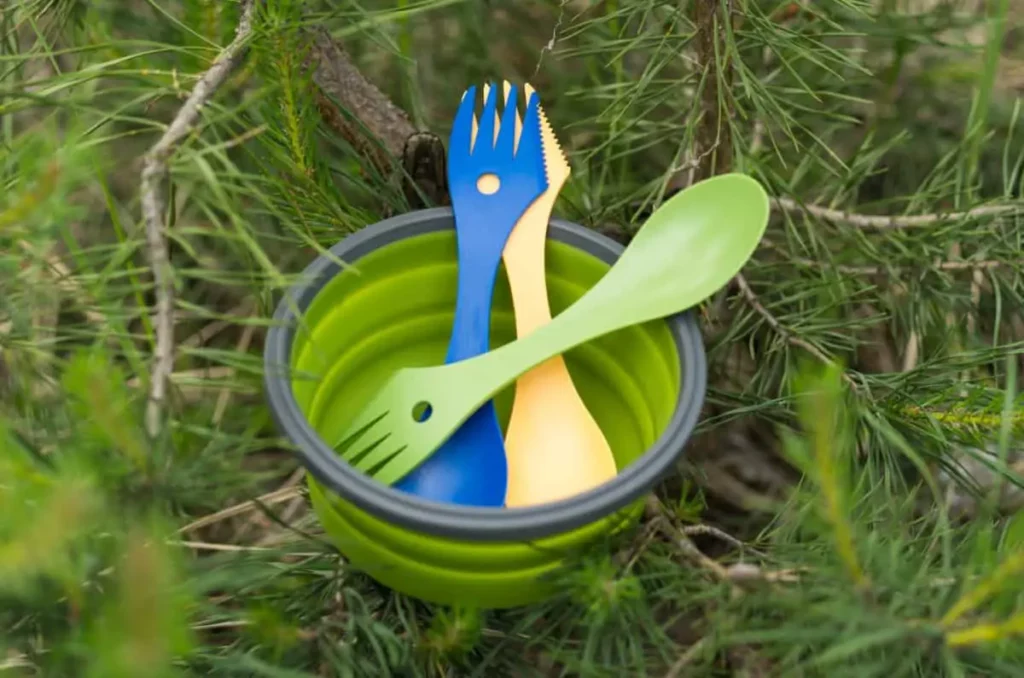
Table of Contents
Steps For Easy Washing
Boil extra water while cooking and set it aside for washing. This provides warm water for washing and be an efficient use of stove fuel.
Tackle the dishes early. Start the cleaning by eating all your food and scooping out the rest before it dries. This will make washing much easier.
Make your largest pot or bowl into your sink.
Use biodegradable soap. A small amount should go a long way.
Wash from cleanest to dirtiest. I usually do cups, bowls, cutlery, pot, in that order.
Air dry or towel dry the dishes. Dishes with handles or carabiners are easiest to hang dry.
Dump your soap in the fire pit or on the soil 200ft from any waterways.
Wring out and hang your scrubber and towel to dry.
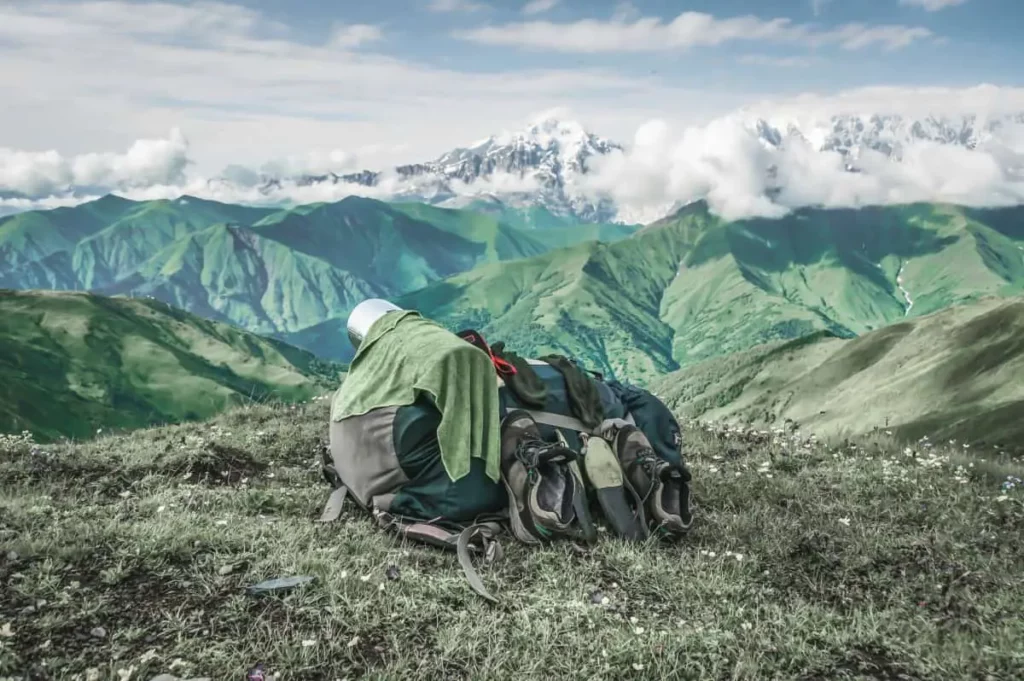
Conservation
Conservation is the name of the game, both nature and your gear. Consuming as little soap and water as possible while cleaning your dishes will leave the smallest trace that you were ever there. It will also allow you to pack less soap leaving more room in your bag.
Even biodegradable soap impacts the environment and wildlife. Though natural, it has ingredients that are not native to all areas. While the introduction of these ingredients won’t single handedly wipe out the flora and fauna, it will work its way into the ecosystem as a pollutant.
Avoid washing dishes or adding any soaps, detergents or food into nearby waterways. Aquatic ecosystems are very fragile and take years or even decades to create a symbiotic relationship between the different species. Any unfamiliar additions to these systems can upset them.
Choosing A Natural Soap
High quality biodegradable soap will be made of all natural ingredients reducing its impact on the area. These soaps use ingredients like olive oil, coconut oil, hemp oil and others. None of these will be derived from petroleum chemicals or heavy detergents.
They don’t usually produce the heavy suds that typical household dish soaps do but that doesn’t mean they aren’t working. Foaming agents are added to soaps to provide the “scrubbing bubbles” but aren’t necessary for cleaning your dishes.
The organic fair trade soap I use for backpacking and at home is Dr. Bronner’s Pure Castile Soap. It does a great job of getting the food and grease off of your dishes and will break down before causing any damage to the environment. I prefer the unscented version.
- MADE WITH ORGANIC OILS & CERTIFIED FAIR TRADE INGREDIENTS: Dr. Bronner's Pure-Castile Liquid Soaps are made with over 70% certified organic...
- ORGANIC & FAIR TRADE PALM KERNEL OIL: Grown by fairly-paid smallholder farmers in Ecuador to ensure sustainable harvesting techniques that...
- NO SYNTHETIC PRESERVATIVES, DETERGENTS, OR FOAMING AGENTS: Our liquid soaps are made with plant-based ingredients you can pronounce—no...
I tend to scrape and lick my bowls clean after a long day of hiking on the trails and a this quality soap cleans to a grease free feel. It’s also good for personal hygiene like bathing, lathering up for use as shave cream and can be used for washing your clothing.
Should I Bring Liquid or Bar Soap Backpacking
The benefit of liquid soap over a bar is that you can pack only as much as you need for your trip. Small plastic squeeze bottles with flip open spouts are cheap and readily available. I buy my soap in a 32oz bottle and use it to fill a smaller bottle for the trail. This keeps it self-contained rather than needing a box that leaks bar soap in your pack.
Liquid soap is much easier to lather and apply as well. Whether it’s for washing dishes or bathing, liquid soap is easier to manage and won’t slip out of your hands and fall in the dirt. A small plastic squeeze bottle can be tossed to the side without being damaged or leaving soapy residue along the ground like a bar would.
Check out our essential backpacking cooking gear guide for a complete list of what should be in your pack. We detail the pros and cons of everything that should be included and what can be left behind.
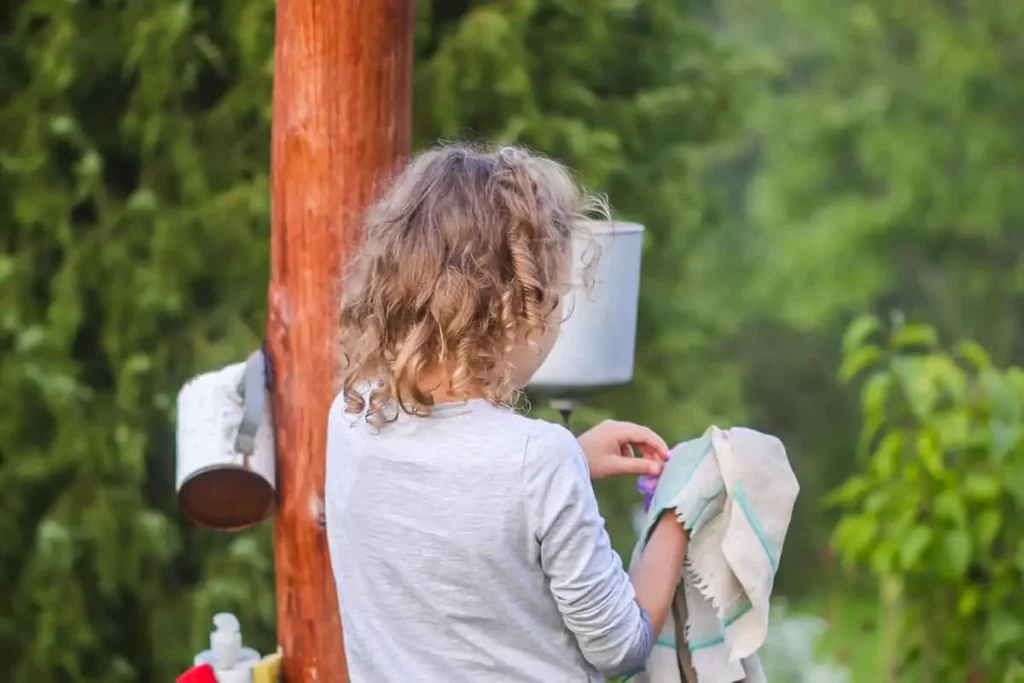
Disposing of Your Wastewater
Always dump any waste water or food scraps at least 200ft or more from any body of water and preferably on soil rather than rock. This will allow the water to be absorbed into the ground to get broken down and filtered before reaching any waterways.
If you have a fire burning, using your dish water to extinguish the flames at night is a good option. Animals, including bears and other predators, can smell food from miles away and any scraps left lying around will attract them to your campsite.
When possible, dig a small hole to pour your dish water in. This will ensure it doesn’t attract animals and give it good separation from any body of water.
Another technique is to pour your dirty water through a rag or bandana to filter out any food scraps. You can pack and carry out the food scraps to leave no trace for animals to follow.
Cleaning Water For Dishes
It’s not necessary to boil or heat your water if it’s from a clean source to begin with. This water should be just fine as is, especially with the addition of a little bit of soap.
If you suspect the nearby water source isn’t clean, then boiling or filtering it is a good idea. Washing your dishes with dirty water can leave bacteria and pollutants on your dishes that can make you sick, not a good thing while out in the bush.
Filtering Water For Dishes
If the water is cloudy with stirred up sand or silt it’s best to filter it through a water filter. If you don’t carry a filter with you, a slower option is to filter it through a rag or cloth. This should remove any of the larger sized dirt and material.
A gravity feed water filtering system is easy to use, just fill it and hang it above your workspace. The large reservoir will supply water for more than just washing. The Sawyer SP160 is a lightweight and packable option for filtering water around camp or on the move.
- Compact gravity-based water filtering system with 0.1 micron absolute dual-threaded Sawyer MINI water filter and 1-gallon reservoir
- High-performance 0.1 micron absolute inline filter fits in the palm of your hand and weighs just 2 ounces; 100% of MINI units individually...
- Dual-threaded MINI allows you to use the cap on the filter for easy on/off functionality; lightweight wide-mouth bladder for fast, easy...
Purifying Water For Dishes
Bringing your water to a rolling boil for 4 minutes will kill any bio-material that may be in it. Another option is to use purification tablets. These tablets do a good job of killing any bacteria that can make you ill but they take a while to complete the job.
Separating Dirt From Water
Another option is to scoop up some water in a dish and let it sit for 20 minutes. Sometimes the dirt will settle to the bottom and any clean water can be poured off the top. The reverse may happen as well where any lighter material can be scooped off of the top and discarded.
Washing Without Water
If you don’t have water available for washing dishes while you’re out in the wilderness you still have a few options to get the job done.
Dry Wiping
Sparing a bit of toilet paper to wipe out your dishes will get the majority of the grime off. This should at least hold you over until you find a water source to bust out the soap and remove the bacteria that stuck around.
Alcohol Wash
If you’re cooking on an alcohol stove and using grain alcohol as fuel, a wipe or rinse with some white lightening should kill off any bacteria once the food is removed. It’s not a perfect solution but it’s better than gut rot.
Wet Wipes
Cleaning with alcohol wipes is a convenient way to sanitize your dishes. You’ll have to bag and pack out the used wipes, not the end of the world. If you plan to use this option select biodegradable wipes that are unscented and have the fewest ingredients.
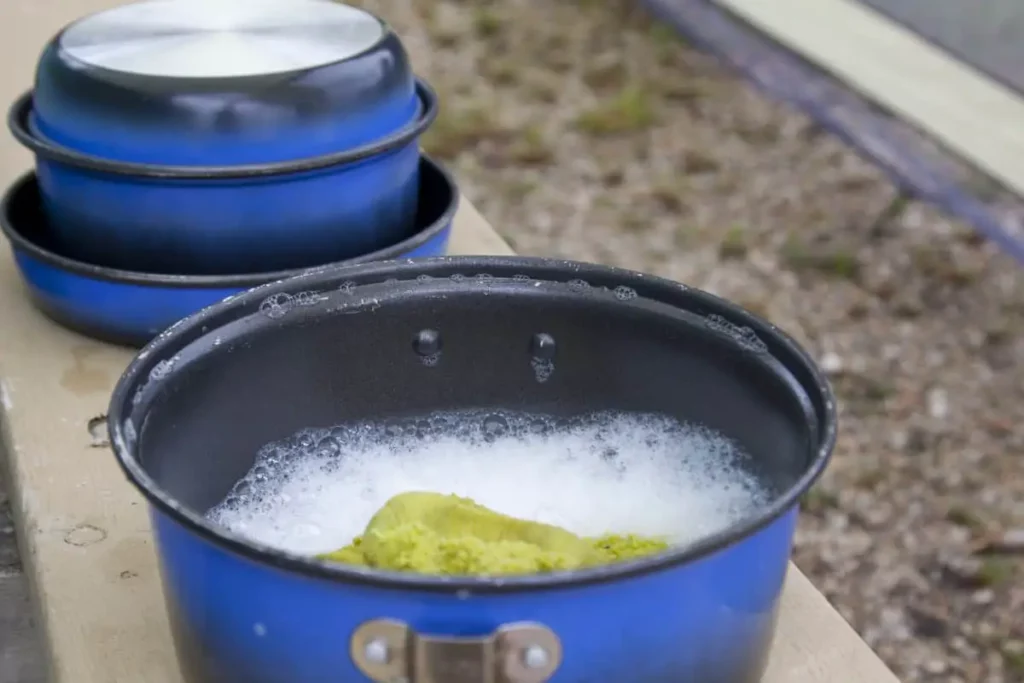
What To Scrub Camp Dishes With
Camping cookware is tough and durable but that doesn’t mean you want to scrape it all up with a knife or metal fork to remove the gunk. Using the same rag that you just scrubbed your armpits with isn’t really appealing either.
Most of the time I use a little bit of water and my hands to apply soap and scrub down my dishes. It’s a pretty simple solution but sometimes a scrubber is necessary to tackle the burnt on food.
Silicone Scrubber
At this point I turn to my silicone scrubber because it can attack the grime without damaging the surface of my cookware. I like silicone or rubber because it doesn’t absorb the soap which makes the lather go further. It also doesn’t soak up the dirty bacteria filled water.
I’ve tried bringing wash clothes and sponges for cleaning my dishes but they always get smelly and take too long to dry. Silicone has neither of these problems.
- Compact, lightweight dual-sided pot scraper
- Essential for kitchen cleanup in the field or at home
- Safely cleans non-stick surfaces without scratching
Natural Scrubbers
If you don’t want to carry a silicone scrubber or sponge to wash your dishes there are always natural alternatives along the trail.
Grass
Using a handful of grass can be abrasive enough to get the last bits of hardened food off the bottoms of your pots and pans. Other plants and foliage can work as well, just avoid anything with sap or fluid inside.
Sand
A mitt full of fine sand is also a good natural scrubber. As long as it’s not mixed into clay or dirt and doesn’t have any pebbles within it, sand will provide a good medium for scrubbing the crusty bits from your dishes.
Backpacking Wash Basin
There isn’t going to be a kitchen sink along the trail and you won’t be washing your dishes in the river as a responsible camper. That leaves only a few wash basin options for out on the trail.
Collapsable Bucket
The other option is to have a collapsible bucket for washing dishes. It requires having an extra item in your pack which means extra weight and less space for other items. The upside to a collapsible bucket is that it makes the task of washing dishes much easier and efficient.
Collapsible buckets can also serve multiple purposes like as a personal wash basin and to help collect firewood or edible plants around your site. When not full of water, a collapsible bucket can be used to temporarily hold gear that you want easily accessible around the campsite.
- DESIGN - Our durable vinyl buckets are great for doing laundry and keeping food cool and the handles make it easy to carry. The seams are...
- USAGE - These foldable water pitchers or vessels can be used in any outdoor activities such as camping, fishing, boating, backpacking,...
- MATERIAL - These stable water buckets are made of durable solid vinyl with waterproof PVC layer that guarantees quality. These buckets and...
Cookware As A Wash Basin
The first and most obvious is your cooking pot. As long as it’s clean or rinsed out after cooking, an 8 cup camping pot can be a perfect kitchen sink. It should be big enough to fit your bowls, cups and utensils one at a time to wash. Once finished with the soapy water, the pot can then be emptied and refilled with fresh water to rinse off the soap.
Should I Towel Dry My Dishes?
If you’re in a rush to get moving after a quick breakfast or lunch, you’ll want to have a towel to dry off your dishes and cookware.
Microfiber Towel
Lightweight microfiber towels come in different sizes and work well for drying dishes. The thin material dries quickly and usually has a loop for hanging from your bag while hiking.
If you have more time at your disposal, laying your dishes out on a rock or hanging your pot or pan from a tree will allow them to air dry. Air drying takes less energy and is generally more hygienic than reusing a camp towel.
- SUPER ABSORBENT - Absorbs water 5 times of its own weight. FAST DRYING - Dry in no time by hanging it with the snap loop.
- ULTRA COMPACT & LIGHTWEIGHT - Easy to pack, minimising luggage space and weight. CARRY BAG - Reusable, with ventilation holes.
- SKIN FRIENDLY - Remarkable soft suede like feel on your skin and face. It can also be used as a blanket to keep warm. POCKET - The 40*72...
Hang To Dry
Keep a few hooks and some cord around for use as a makeshift drying line. Having paracord or a carabiner looped through the handles of your cookware is very handy.
Many backpacking cookware sets come in a mesh bag so they can continue to dry on your journey. If yours doesn’t then you can purchase one separately. They’re handy to have with you on the trail for drying dishes and anything else that needs to be aired out.
Wrapping Up
Washing dishes is not the part of backpacking and hiking we look forward to most, but neither are gut issues or illness. Take a few steps to ensure you stay healthy on your journey and leave only footprints on the trail.
Following the tips in this article will make sure the waterways stay clean for future generations of campers and keep the animals to the diet they’re designed for. Keep It Clean!
